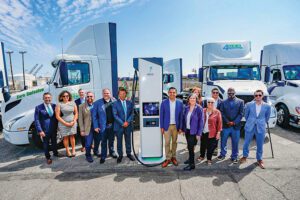
The Port of Long Beach and industry partners on Sept. 13 showed how one port trucking company is converting to a full zero-emissions trucking fleet three years from now, a decade before the 2035 zero-emissions goal set by the port’s Clean Air Action Plan.
The announcement was made at 4 Gen Logistics in the Port of Long Beach, where Electrify America intends to install 60 public charging stations by the end of 2023 to serve its own fleet of electric trucks, as well as other companies’ trucks.
4 Gen also plans to purchase 41 Volvo and 20 Kenworth electric heavy-duty trucks, with plans eventually calling for a 100-vehicle zero emissions fleet. In addition, 4 Gen’s site in Rialto, Calif. will host 30 charging stations.
Long Beach Mayor Robert Garcia, POLB officials and representatives from Volvo, Kenworth, Electrify America, the South Coast Air Quality Management District, the California Air Resources Board and CALSTART were on hand to celebrate the company’s plans.
Standing near a model charging station and zero-emissions, heavy-duty electric trucks, Long Beach Mayor Robert Garcia noted the changeover to cleaner trucks at the nation’s largest seaport complex will be supported by the Clean Truck Fund rate, which is expected to generate $90 million in its first year, or $45 million each for the Long Beach and Los Angeles seaports.
“The Clean Truck Fund rate has been a huge step forward as we transition to a zero-emissions trucking fleet by 2035,” Garcia said. “It’s exciting to see this kind of true zero-emission technology be put into operation at our port and help to improve air quality across our region.”
Port of Long Beach Executive Director Mario Cordero noted the progress being made by the port in the quest for zero emissions. For example, about $70 million in grant funding has been secured to support $150 million in demonstration projects that are deploying zero-emissions and near zero-emissions cargo handling equipment and trucks at POLB terminals and on the roads of Southern California.
“Together, let’s transform this industry and show the world it’s possible to eliminate the emissions that are harming health and heating up the planet,” Cordero said. “And let us lead by example.”
“The future is zero emissions, and alongside partners such as 4 Gen Logistics, Electrify America, Volvo and Kenworth, we are going to lead the industry there,” Long Beach Harbor Commission President Sharon Weissman added.
The Port of Long Beach has set a goal to achieve zero-emissions drayage trucking by 2035. Collection of the Clean Truck Fund (CTF) rate began April 1. Cargo owners are paying up to $20 per loaded container hauled by drayage trucks in and out of the container terminals.
Exemptions from the rate are provided for loaded containers hauled by zero-emissions trucks, and under limited circumstances, by low-nitrogen oxide trucks. Each port’s tariff requires payment of the CTF rate by cargo owners or their authorized agents, and includes a provision prohibiting payment by drayage trucks or operators.
Phasing out older, more polluting trucks has been key to clean air gains the two San Pedro Bay ports have made since the original Clean Truck programs were launched in 2008. Diesel emissions from trucks have been cut by as much as 97% compared to 2005 levels, port data show.
